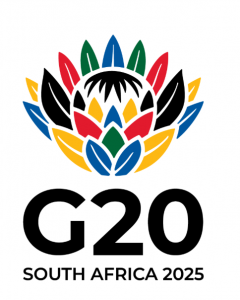Ubuntu in Action Resonates with South Africa’s Development Vision
South Africa’s landmark G20 Presidency reached its zenith today with the closing plenary of the G20 Interfaith Forum in Cape Town.
Through our collective efforts, we can build a more compassionate and sustainable world.”
CAPE TOWN, WESTERN CAPE, SOUTH AFRICA, August 14, 2025 /EINPresswire.com/ -- South Africa’s landmark G20 Presidency reached its zenith today with the Closing Plenary of the G20 Interfaith Forum in Cape Town. Under the banner “Ubuntu in Action: Solidarity, Equality, Sustainability,” faith leaders, policymakers, and scholars from around the globe gathered to translate shared values into concrete initiatives supporting vulnerable communities.— Deputy Minister Hendricks
Deputy Minister’s Remarks
Mr. Ganief Ebrahim Hendricks, Deputy Minister of Social Development, addressed delegates on behalf of the Department of Social Development, the Government of National Unity, and President Cyril Ramaphosa. He welcomed participants to South Africa’s Mother City, expressing heartfelt gratitude for their dignified engagement. In his opening remarks, he affirmed that the presence of faith communities at this forum underscores their central role in shaping international development and promoting world peace.
Deputy Minister Hendricks emphasized that the G20 theme, “Solidarity, Equality, Sustainability,” reflects South Africa’s commitment to prioritizing the developmental aspirations of the Global South and the African continent. He noted that in an era of rising nationalism and geopolitical tension, faith communities must lift their prayerful voices against injustice and advocate tirelessly for peace.
Drawing attention to urgent humanitarian crises in Gaza, Jammu & Kashmir, and Western Sahara, he urged faith leaders to remain steadfast in their pursuit of justice and compassion. Reflecting on the forum’s five days of robust discussion, he celebrated the collaborative deliberations on poverty eradication, refugee displacement, child malnutrition, and gender equality, calling them the seeds of constructive solutions that reaffirm a shared commitment to uplift those most in need.
Highlighting South Africa’s own experience, Deputy Minister Hendricks commended the extraordinary resilience of religious institutions during the COVID-19 pandemic. He praised their frontline contributions—in strengthening families, empowering youth, and responding to gender-based violence and natural disasters—as living embodiments of Ubuntu.
He concluded with a stirring call to action: “Let us continue to walk together in the spirit of Ubuntu, guided by love, justice, and mutual respect. Through our collective efforts, we can build a more compassionate and sustainable world.”
Bishop Sipuka’s Call to Action
In the closing address, Bishop Sithembele Sipuka, President of the South African Council of Churches, issued a clarion call for faith communities to move “from words to witness.” He reminded the audience that Ubuntu is not merely philosophy but prophecy—a summons to translate our interconnectedness into concrete acts of dignity and justice.
Bishop Sipuka offered a candid critique of religious complicity in systems of oppression, warning that proximity to power can blind institutions to the cries of the poor. He exhorted leaders to reclaim their prophetic integrity by modeling transparency and courage. He spoke of faith-based food security efforts that restore pride through community gardens and agricultural partnerships rooted in traditional wisdom.
He urged the adoption of an “Accountability Covenant” to ensure debt cancellation serves the most vulnerable rather than entrenched elites. Bishop Sipuka highlighted the importance of interfaith educational collaborations to foster religious literacy, emotional intelligence, and peacebuilding.
He envisioned places of worship transformed into sanctuaries of hope for migrants and refugees, offering both hospitality and practical support. Finally, he invoked the sacred duty of creation care, calling on religious communities to lead the charge toward renewable energy and sustainable living.
Quoting Pope Francis, Bishop Sipuka reminded attendees to “have the smell of the sheep”—to spend more time among informal settlements than in government offices, to listen more to the silent sorrow of the oppressed than to the empty promises of politicians. He closed with an urgent challenge: “The poor are tired of our calls. They are hungry for our commitment. Let each of us return home and begin—not waiting for perfect conditions, but acting now with sincerity and urgency.”
Conclusion
The G20 Interfaith Forum in Cape Town has emerged as a defining moment in South Africa’s G20 Presidency. By uniting diverse faith traditions around a shared covenant for justice, compassion, and sustainability, the Forum has set the stage for lasting, transformative action, moving boldly from words to witness on behalf of the world’s most vulnerable.
Marianna E Richardson
G20 Interfaith Forum
+1 202-460-9070
email us here
Visit us on social media:
YouTube
Legal Disclaimer:
EIN Presswire provides this news content "as is" without warranty of any kind. We do not accept any responsibility or liability for the accuracy, content, images, videos, licenses, completeness, legality, or reliability of the information contained in this article. If you have any complaints or copyright issues related to this article, kindly contact the author above.


